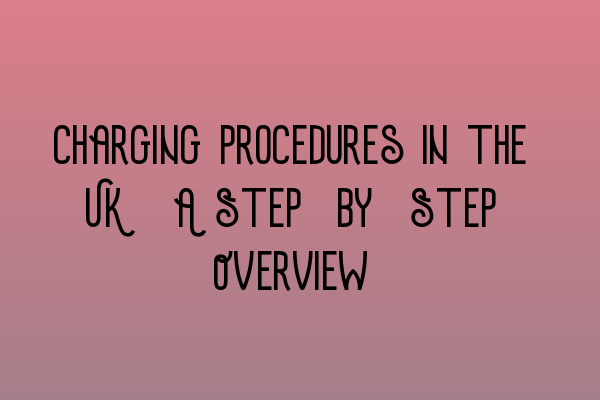Charging Procedures in the UK: A Step-by-Step Overview
Welcome to SQE Criminal Law & Practice Law UK! As experts in criminal law, we understand that the charging procedures in the UK can be complex and overwhelming. That’s why we’ve created this step-by-step overview to help you navigate through the process with ease and confidence.
1. Arrest and Detention
The charging process begins with an arrest. When a person is suspected of committing a criminal offense, they may be arrested by the police. During the arrest, the individual will be informed of their rights and the reasons for their arrest. They may then be taken into custody for further questioning and investigation.
2. Investigation
After the arrest, the police will conduct an investigation to gather evidence and build a case against the suspect. This may involve interviewing witnesses, collecting physical evidence, and reviewing any relevant documents or records. The length of the investigation can vary depending on the complexity of the case.
3. Charging Decision
Once the investigation is complete, the police will make a charging decision. This decision is based on the evidence gathered during the investigation and whether there is a reasonable prospect of conviction. If the decision is made to proceed with charges, the suspect will be notified of the specific offense(s) they are being charged with.
4. Bail or Remand
After being charged, the suspect may be released on bail or remanded into custody. Bail is where the suspect is released from custody with certain conditions, such as surrendering their passport or regularly reporting to the police station. Remand, on the other hand, is where the suspect is held in custody until their trial. The decision on whether to grant bail or remand is made by the court based on several factors, including the seriousness of the offense and the likelihood of the suspect fleeing or interfering with the case.
5. Court Proceedings
Once the suspect has been charged and bail/remand decision has been made, the case will proceed to court. At court, the accused will have the opportunity to enter a plea of guilty or not guilty. If they plead guilty, the case may proceed directly to sentencing. If they plead not guilty, a trial will be scheduled where evidence will be presented and a jury or judge will determine the defendant’s guilt or innocence.
6. Outcome
After the trial, the court will deliver a verdict. If the defendant is found guilty, the court will proceed to sentencing. Sentences can range from fines and community service to imprisonment, depending on the nature and severity of the offense. If the defendant is found not guilty, they will be acquitted, and the case will be closed.
At SQE Criminal Law & Practice Law UK, we have the expertise and experience to guide you through every step of the charging process. If you require legal representation or advice, please do not hesitate to contact us.
Related Articles:
- Legal Representation for Delaware LLCs in the UK: Expert Advice
- Ensuring Ethical Business Practices: Delaware’s Code of Conduct
- Legal Challenges for UK Businesses in the U.S.: Strategies for Overcoming Hurdles
- UK Criminal Law: An In-Depth Analysis of the British Legal System
- Legal Challenges for UK Businesses in the U.S.: Strategies for Overcoming Hurdles
